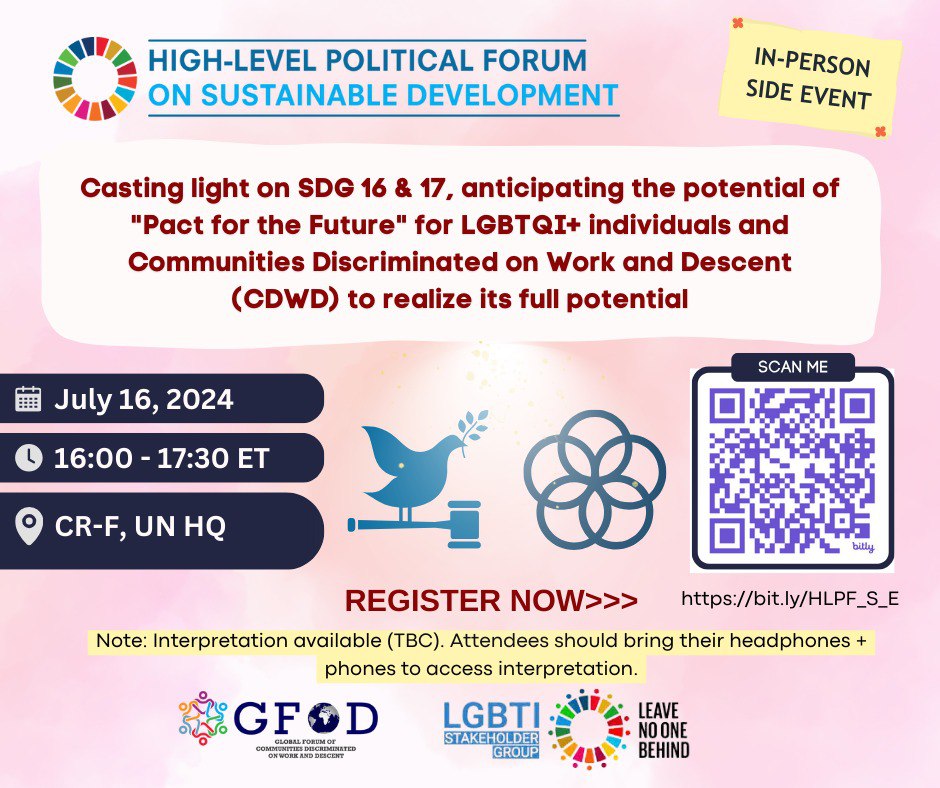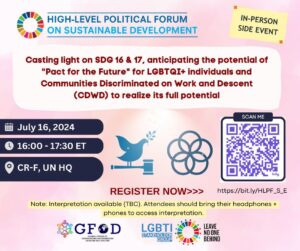
- This event has passed.
Casting light on SGD 16 & 17, anticipating the potential of “Pact for the Future” for LGBTQI+ individuals and Communities Discriminated on Work and Descent (CDWD) to realize our full potential
July 16, 2024 @ 4:00 pm - 5:30 pm UTC+5.5

2024 High-Level Political Forum
LGBTI Stakeholder Group and the Stakeholder Group of Communities Discriminated on Work and Descent.
The LGBTI Stakeholder Group and the Stakeholder Group of Communities Discriminated on Work and Descent (SG-CDWD), invite you to a joint side event on the margins of the annual High-Level Political Forum on Sustainable Development (HLPF).
Around the globe, LGBTI populations are still criminalized and experience stigma, discrimination, violence, and other human rights violations due to their sexual orientation, gender identity, gender expression, and sex characteristics (SOGIESC). Further, LGBTI populations face higher barriers than their counterparts in accessing development opportunities, funding, needs and services, which are reinforced by punitive policies. LGBTI persons who face multiple and intersecting forms of discrimination due to their gender, age, race, ethnicity, ability, class, caste, socioeconomic status, work, origin, migration status, and other factors that drive exclusion, are even more marginalized and face even greater barriers in accessing development opportunities.

Event Overview
This side event will focus on the protection and liberation of LGBTQI people and Communities Discriminated on Work and Descent. We will explore strategies, avenues for joint actions, and work to improve the current text and annexes of the Pact for the Future, bridging the gaps between the SDGs, Agenda 2030 and our aspirations.
Objectives:
- To explore how LGBTQI+ people and Communities Discriminated on Work and Descent can contribute to building peaceful and inclusive societies for sustainable development, as well as strengthening the means of implementation for the SDGs (SDG 16 and 17)
- To highlight the legal and systemic discrimination, that marginalized communities often face due to multiple and intersecting forms of discrimination.
- To articulate our ambitions for the Pact of the Future, ensuring it goes beyond protection and ending discrimination, and employs visionary ambitious language focusing on liberation and equity.
Themes for the discussion
- Inclusive strong institutions
Strong institutions must be inclusive, representing the diversity of the population and ensuring that minority voices are heard in governance and policy-making. Peace and justice are intrinsically linked to the protection of human rights, allowing minorities to live free from persecution and discrimination.
Partnerships with member states, UN Agencies and UN Experts must continue to enhance the capacity of organizations empowering LGBTI and CDWD individuals to advocate and enjoy their rights. International cooperation and solidarity, leveraging global partnerships to promote equality and justice is key to achieving the Agenda 2030 and fighting towards ambitious language in a Pact of the Future.
2. Manifestations of discrimination
a. Assimilation pressures
Both the LGBTQ community and CDWD are pressured to assimilate into “mainstream society” by conforming to expected identities and roles, for example by speaking the correct language, complying with the expected identity, and performing tasks expected of us dutifully.
b. Marginalization
CDWD often live on the margins, physically separated from the rest of society, with the expectation of serfdom related to the most menial tasks often related to death, excrement, rubbish, iron work and other forms of labor.
Similarly, LGBTI+ people often have limited access to education, and cannot easily enter the labor market, thus lacking a real head start on life. LGBTI+ people, especially non-cisgender people, are often criminalized and live under severe legal circumstances that prevent them from pursuing economic agency. Even when “homosexuality” is not explicitly criminalized, many penal codes around the world criminalize “cross-dressing” which limits non-cisgender people’s access to social protection and economic opportunities. LGBTI+ people continue to struggle to meet basic necessities, lose jobs, and end up homeless.
c. Invisibility
“Invisibility”, in the context of LGBTI people, refers to the societal tendency to overlook or ignore the existence and experiences of individuals who identify as lesbian, gay, bisexual, transgender, or intersex. This invisibility can manifest in various ways, such as lack of representation in media, limited legal protections, discrimination, and social stigma. It can also refer to the internal struggles that LGBTI individuals may face in terms of hiding or suppressing their identities due to fear of rejection or discrimination.
Similarly, invisibility is a characteristic assigned and expected from CDWD and LGBTI people – if they do not comply, they are “put in their place” using methods only limited by the imagination of our oppressor’s cruelty. For LGBTI people, this can mean denying their gender identity, sexual identity and/or sex characteristics. For CDWD, it means performing the most menial tasks of a society, including manual scavenging human and animal waste or performing slave labour.
Conclusion
By highlighting the experiences of LGBTI+ people as well as those of Communities Discriminated on Work and Descent (CDWD), this event aims to promote inclusive policies and inspire collective action. Ultimately, this conversation is one step towards an inclusive and sustainable future.

